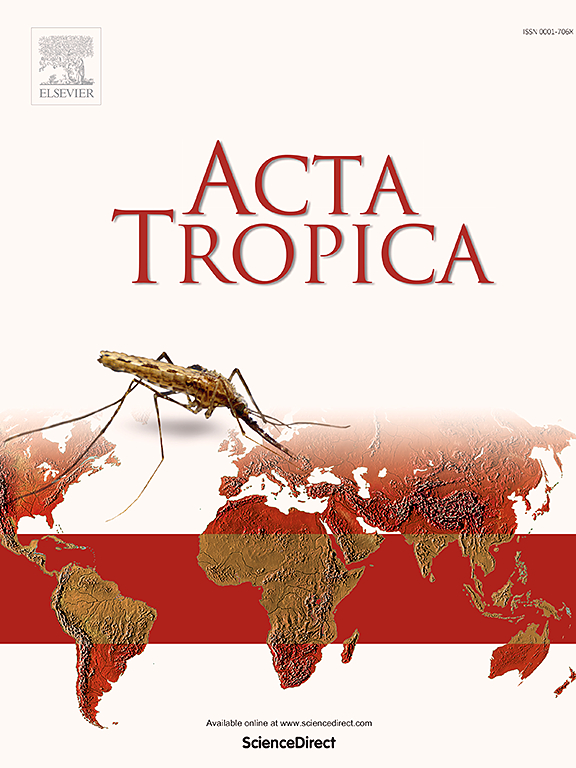The value of nomogram analysis in prediction of cerebral spread of hepatic alveolar echinococcosis
IF 2.1
3区 医学
Q2 PARASITOLOGY
引用次数: 0
Abstract
Background
The prognosis after brain metastasis of alveolar echinococcosis is inferior, but there is currently no effective method to predict brain metastasis.
Purpose
To explore the value of a nomogram constructed based on a CT plain scan and enhanced imaging features combined with clinical indicators in predicting brain metastasis of hepatic alveolar echinococcosis (HAE).
Materials and Methods
The imaging characteristics and clinical indicators of 116 patients diagnosed with HAE in the Affiliated Hospital of Qinghai University from 2015 to 2022 were retrospectively collected. The data were randomly divided into a training set and a validation set according to 7:3, and the difference between the two groups was analyzed. Binary logistic regression analysis was used to obtain independent predictors of brain metastasis in HAE, and a prediction model was constructed based on this and expressed in the form of a nomogram. Receiver operating characteristic (ROC) curve and calibration curve (CRC) were used to evaluate model performance, and decision curve analysis (DCA) was used to assess the clinical value of the predictive model.
Result
A total of 116 HAE patients were included (average age 38.07±15.09 years old, 54 males and 62 females, 81 patients (70 %) in the training set, and 35 patients (30 %) in the validation set). There was no statistically significant difference between CT plain scan and enhanced imaging features combined with clinical indicators between the training set and the validation set (p > 0.05). After statistical analysis, it was found that whether there is invasion of the inferior vena cava, whether there is invasion of the hepatic artery, and whether there is metastasis to other organs are independent predictors of brain metastasis in HAE. A prediction model was built based on these three variables. The area under the ROC curve (AUC), cutoff value, sensitivity, and specificity of the training set and validation set were 0.922 and 0.886, 0.6934 and 0.6643, 75.00 and 84.62, 94.34 and 81.82, respectively. CRC shows good consistency between the predicted probability and the actual value of the sample. DCA showed that the clinical value of the model was high.
Conclusion
The nomogram constructed based on imaging features combined with clinical indicators can effectively predict whether HAE will develop brain metastasis, which is helpful for clinicians to quickly screen out high-risk patients with HAE developing brain metastases, evaluate patient prognosis, and is more conducive to the realization of individualized and precise medical decisions.
提名图分析在预测肝泡棘球蚴病脑扩散中的价值。
背景:目的:探讨基于CT平扫和增强影像学特征结合临床指标构建的提名图预测肝泡型棘球蚴病(HAE)脑转移的价值:回顾性收集青海大学附属医院2015年至2022年确诊的116例HAE患者的影像学特征和临床指标。将数据按照7:3随机分为训练集和验证集,分析两组数据的差异。采用二元逻辑回归分析得出HAE脑转移的独立预测因子,并在此基础上构建预测模型,以提名图的形式表示。利用接收者操作特征曲线(ROC)和校准曲线(CRC)评估模型的性能,并利用决策曲线分析(DCA)评估预测模型的临床价值:共纳入116例HAE患者(平均年龄(38.07±15.09)岁,男性54例,女性62例,训练集81例(70%),验证集35例(30%))。训练集和验证集的 CT 平扫和增强成像特征结合临床指标之间的差异无统计学意义(P > 0.05)。经过统计分析发现,是否侵犯下腔静脉、是否侵犯肝动脉、是否转移至其他器官是HAE脑转移的独立预测因素。根据这三个变量建立了一个预测模型。训练集和验证集的 ROC 曲线下面积(AUC)、临界值、灵敏度和特异性分别为 0.922 和 0.886、0.6934 和 0.6643、75.00 和 84.62、94.34 和 81.82。CRC 表明预测概率与样本实际值之间具有良好的一致性。DCA显示该模型的临床价值较高:基于影像学特征结合临床指标构建的提名图能有效预测HAE是否会发生脑转移,有助于临床医生快速筛查出发生脑转移的高危HAE患者,评估患者预后,更有利于实现个体化、精准化的医疗决策。
本文章由计算机程序翻译,如有差异,请以英文原文为准。
求助全文
约1分钟内获得全文
求助全文
来源期刊

Acta tropica
医学-寄生虫学
CiteScore
5.40
自引率
11.10%
发文量
383
审稿时长
37 days
期刊介绍:
Acta Tropica, is an international journal on infectious diseases that covers public health sciences and biomedical research with particular emphasis on topics relevant to human and animal health in the tropics and the subtropics.
 求助内容:
求助内容: 应助结果提醒方式:
应助结果提醒方式:


